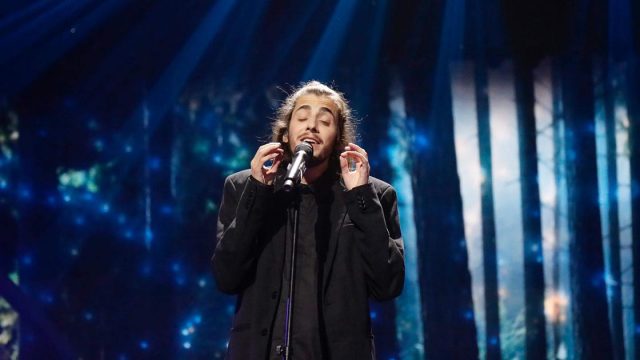There are many ways to win the Eurovision Song Contest – after all, Russia didn’t even compete in 2017 but there will be many that would consider the outcome to be positive for the Kremlin (but it’s not a political show, you understand).
It’s a Song Contest that looks for the best singer, expects the flashiest fireworks, anticipates a well-choreographed dance routine… but it also treasures a low-key performance, artistic simplicity, reflecting modern music all packaged for family entertainment. We expect each entry to be the pinnacle of what that country can presents, but assuming a delegation finds the right balance of every factor, the audience has to be told ‘this is the one’
What role does press and marketing play in the Song Contest?
Storytelling Tools For A Modern Song Contest
The same topics rise in the public conscious as each Eurovision approaches: ‘This country will vote for that country every year, regardless of song quality;’ ‘That country only won because of current events, not because the song is any good;’ ‘If a country does well, it’s because they found a way to cheat.’
But if those were actually true and actual deciding factors each year, how does that explain Portugal’s victory? Or Denmark, Austria, or Germany in recent years?

Salvador Sobral
Polls wavered in the days leading up to Kyiv 2017 between an Italian man with literal ‘sex appeal’ backed up with an ape suit and a Portuguese jazz singer standing alone onstage. It was all but decided: Italy was destined to win, so what happened? Italy’s Francesco Gabbani appeared cocky and bored and seemed to be ready to move on leading up to the Final – did that affect his outcome?
Meanwhile Portugal’s Salvador Sobral was in and out of hospital and most appearances in preparation for the performance were made by his sister. The story presented through the media was one of hope, never one looking to pull heartstrings. The result was that of a pure song winning, but could a native language-jazz waltz combo have won without such a narrative? How important is the attachment to the singer and their journey in a song contest?
The songs with the high notes, vocal presence, best-sounding song with headphones, etc are not mentioned in a Song Contest. Is it because our favourite show is something different… the Eurovision Story Contest? What tropes perform well at each year’s Contest, and can we predict the final result based on the trope that will be employed?
The No Shows
Albania seems to love those long, drawn-out notes perfect for impressing the juries at the Eurovision Song Contest, and it certainly helped achieve their best result, fifth place in 2012 with Rona Nishliu. 2017’s Lindita didn’t get this same treatment with ‘World’, reaching 14th and not qualifying, but then, what do you remember hearing of Lindita? She was missing the elements that told a story during the three minutes.
This year’s No Show: Romania’s entry with The Humans. ‘Goodbye’ is soaring at times and has big moments as a pop ballad, but what will happen onstage and will it be enough?
The Enigmas
Armenia in 2017 had a three minute song that sounded like it lasted an hour—in a good way! It grew and grew until it exploded, but for a first listen would it work? Watching a video taken from the crowd while she performed at the final, the crowd seemed distracted, waiting. When the big moment finally happened (in the last 30 seconds) it took some pyrotechnics to get an explosion from the crowd. It scored 18th and nobody talked about it, even to say that it was cheated out of Saturday night á la Finland not qualifying at all.
This year’s guesstimate: It’s hard to say who no one is talking about so early when the preview concerts have just started, but given how early they were announced I’m going to go with Switzerland’s Zibbz and ‘Stones’. The song has a fine message, a different sound, but no one’s talking about that—yet. Let’s be positive for Switzerland’s indie-flavored duo!
The Under-Performers
Maybe it was always a stretch, and maybe they were never bound to qualify, but I took personal offense when Latvia didn’t qualify with the electronic pop ‘Line‘ – in fact, they placed last. Latvia hosted its fourth annual Pre-Party in Riga for 2017 and the band performances there were strong, but maybe they required Aminata to get press instead of… awkwardly shaped neon art? I had high hopes for the performance, and I think I can admit it fell short of what I had wanted.
This year’s guesstimate: I’m looking at you, Czech Republic’s Mikolas Josef with ‘Lie to Me.’ This artist has the swagger, charisma, and charm that Jüri Pootsmann sorely needed in 2016 and I will be heartbroken if he underperforms on the night. Dear Mikolas, you’re on fire.
How about winners that didn’t, well, win? The songs that should’ve never rested on their laurels as it were. The song is everywhere and everyone is talking about it, but tripped on the edge of greatness?
The Promised Ones
Belgium’s Blanche was in the group of potential winners with her low-key song ‘City Lights’, but the press reports of her nervous rehearsal caused her betting pool to swim for the edge. The advantage to that was the synergy with the lyrics,,, her chorus including the sublime line “all alone in the danger zone”. To first time viewers it could be seen as a “performance”, though those who followed her story knew her struggle.
This year’s guesstimate: Let me do some non-jinxing, perfectly safe rituals here, alright, now that that’s done, prepare yourself… Finland’s Saara Aalto with ‘Monsters’. Now, don’t get me wrong, I love this, but it’s doing really well right now, and that causes me panic. Let’s just leave it at that and pretend I didn’t say anything, shall we?
The Gimmicks
The press loved to discuss whether or not Romania’s Ilinca and Alex Florea rap-yodeling track, aptly titled ‘Yodel It!‘, was a gimmick or a legitimate song. The song was in every Eurovision conversation in 2017, but the question was “was it a real song?” rather than how well could it do—would it have mattered if it had been the latter? The duo still gave them seventh place in the Grand Final, not even beating Romania’s overall best of third place.
As with Saara, I’m going to need another moment with the warding-off-evil tricks. Ok deep breath. This year’s guesstimate: Estonia’s Elina Nechayeva with the opera track ‘La Forza.’ This is perfection—she’s proven she can do it live, it’s clear, she’s talented, but how many out there will see and hear opera and tune out? Hopefully they’re impressed by her dress…
The Linguists
Language as its own gimmick? In a Song Contest involving multiple countries with their own languages, English is still the most prevalent choice—sometimes to an artist’s detriment (my precious Greta Salóme).
In 2017 we were treated to the first all-Belarussian language entry with Naviband. The group was ever-present in interviews, performances, on the red carpet—everywhere they went they were delightfully entertaining, and the track was well-discussed. However, the band still scored 17th place. I was hurt; I anticipated them landing Top 5.
This year’s guesstimate: This year’s entries have presented a delightful mix of native language entries, and so far I’m loving all of them. I’m going to go with Hungary’s AWS and the post-hardcore track ‘Viszlát nyár’ because they have a chorus including the translation “Goodbye, summer, you’re out late / Because you lied, you will be me / But you did not come.” Last year’s Hungarian entry, also non-English (Hungarian and Romani) landed eighth place, and do you know how much I would leap into the air if a post-hardcore non-English song did well at Eurovision?!
For Eurovision 2018 the big news (yet) doesn’t seem to be how good anything is yet. The point is that we all have an idea of what we want from our Song Contest. If an article surfaces that puts our favourites in a bad light, will it affect our take on the night? If it were truly about the performance, should we let it?
Sometimes it comes down to presence, that star quality that demands you stare at, or more importantly, a song that makes you vote for it. Loreen performed mostly solo on a mostly bare stage, as did Jamala (plus her tree). Måns Zelmerlöw had a simple costume, if you could even call it a costume, and danced alongside a stick figure on a screen. They were all favourites to win going in, not surprise winners. The same can be argued for our Salvador Sobral; the song may have been a “dark horse” in nature, but it was slated to land at least second place for the time leading up to the Grand Final.
Show me this, fellow internet citizens: I would like another Netherland’s The Common Linnets performance—a shock win, or at least second placement. I want to have the song no one mentions, no one expects to do well, but secretly loves.
Here’s hoping—wouldn’t it make for such a fantastic show?










I think Denmark is the one that people seem to love, but don’t talk about. It has the potential to explode on the stage on Saturday (yes, it’s qualifying). Denmark is my pick for surprise winner.
Interesting article; thanks, Jenny!
@ 4porcelli, you are everywhere. 🙂
@togravus, are you saying I have too much time on my hands ;-)?
@ 4porcelli, of course not. Just that you are a very passionate and well-informed fan. 🙂
@togravus – a life without passion would be a life not worth living as I’m sure you’ll agree so it’s good to share this passion with you, my friend!
Great article! I’m hoping for a surprise winner too! A song nobody is expecting until the night.
I feel a lot of people are overlooking Ukraine right now. It’s one of my dark horses of this year.